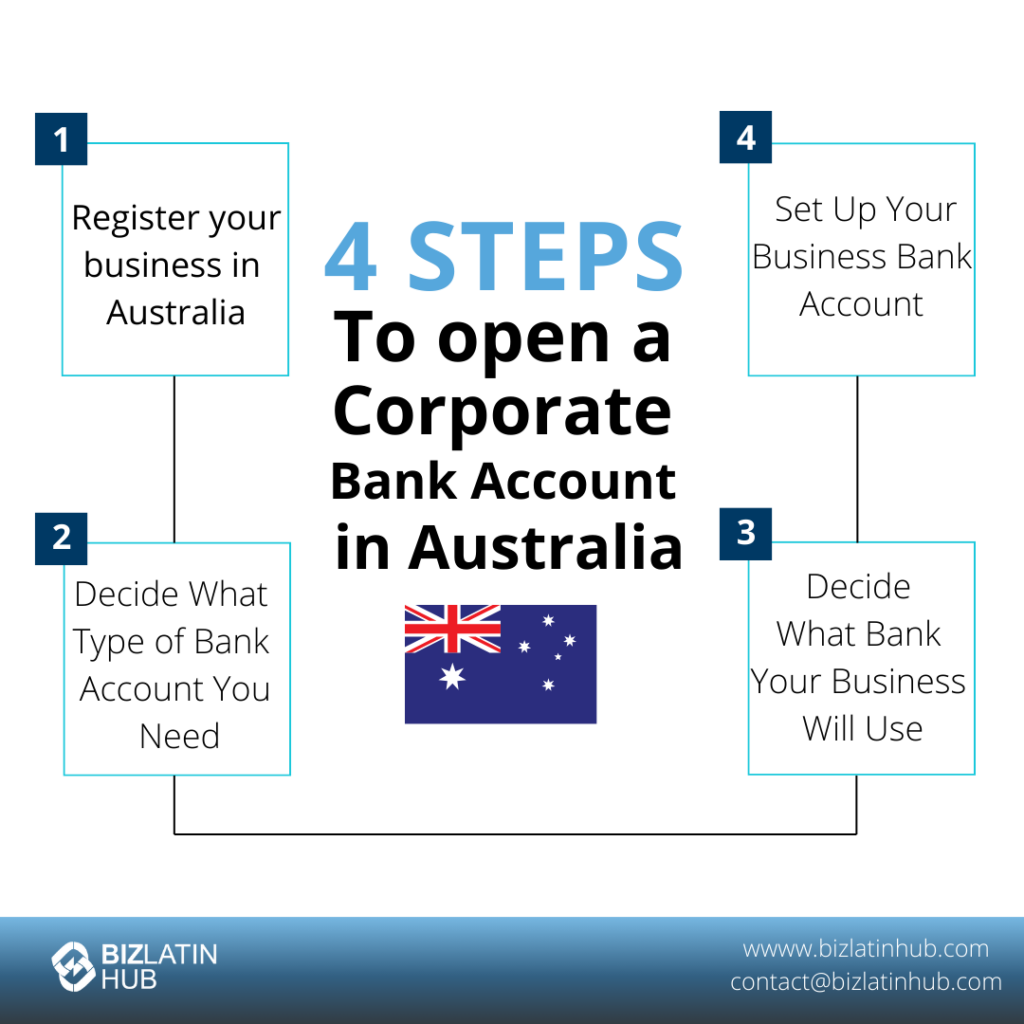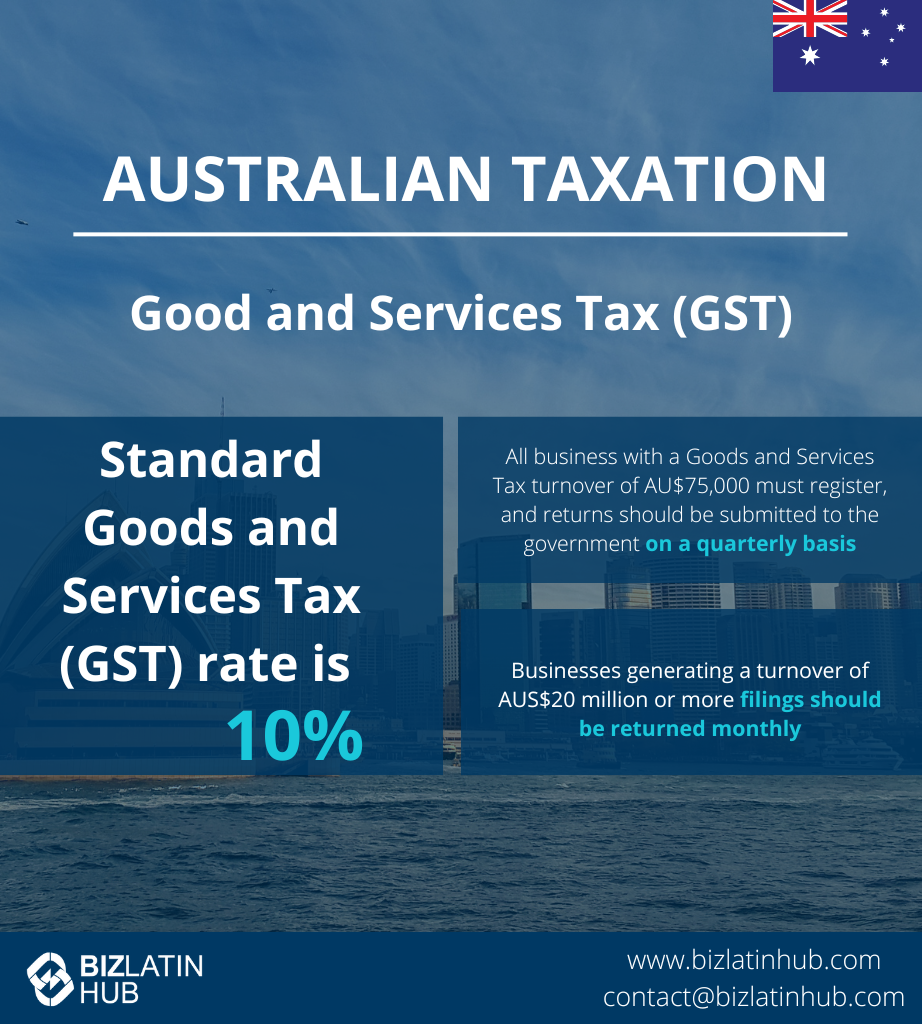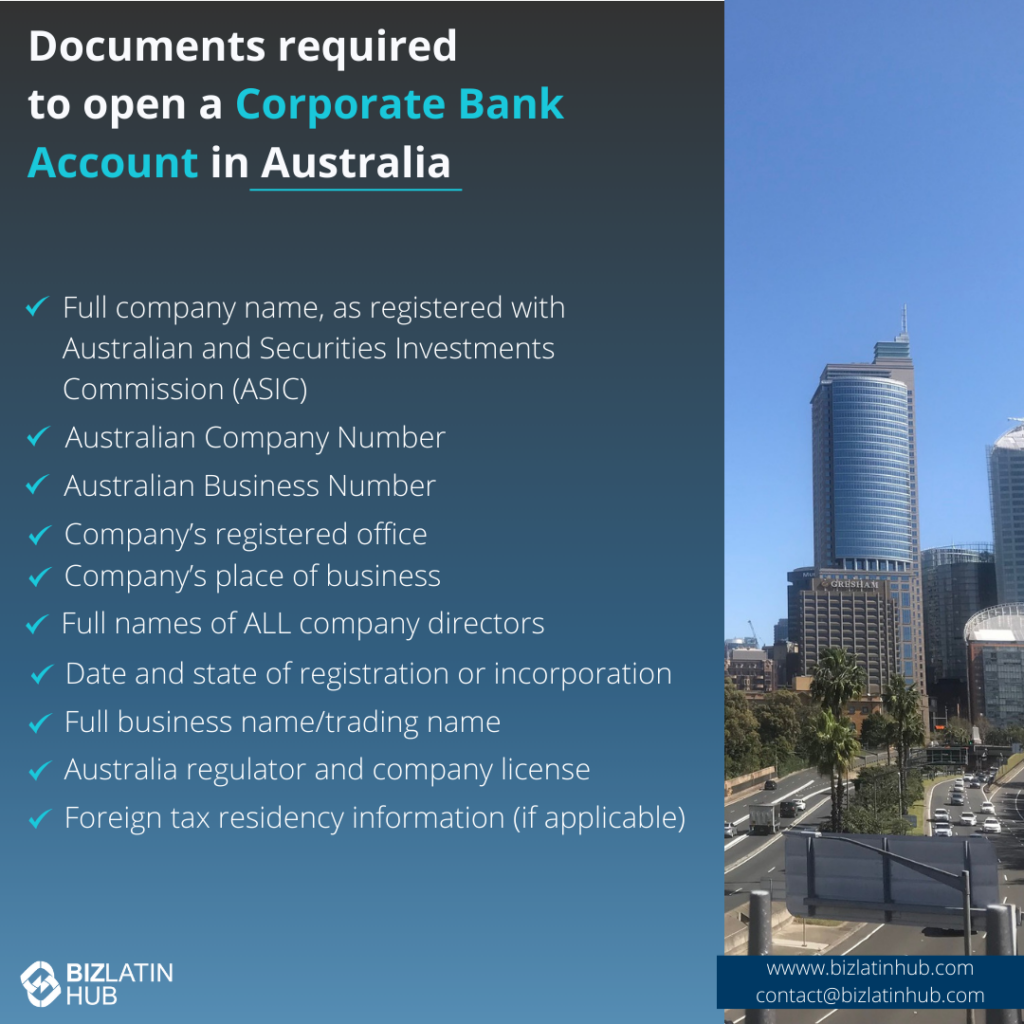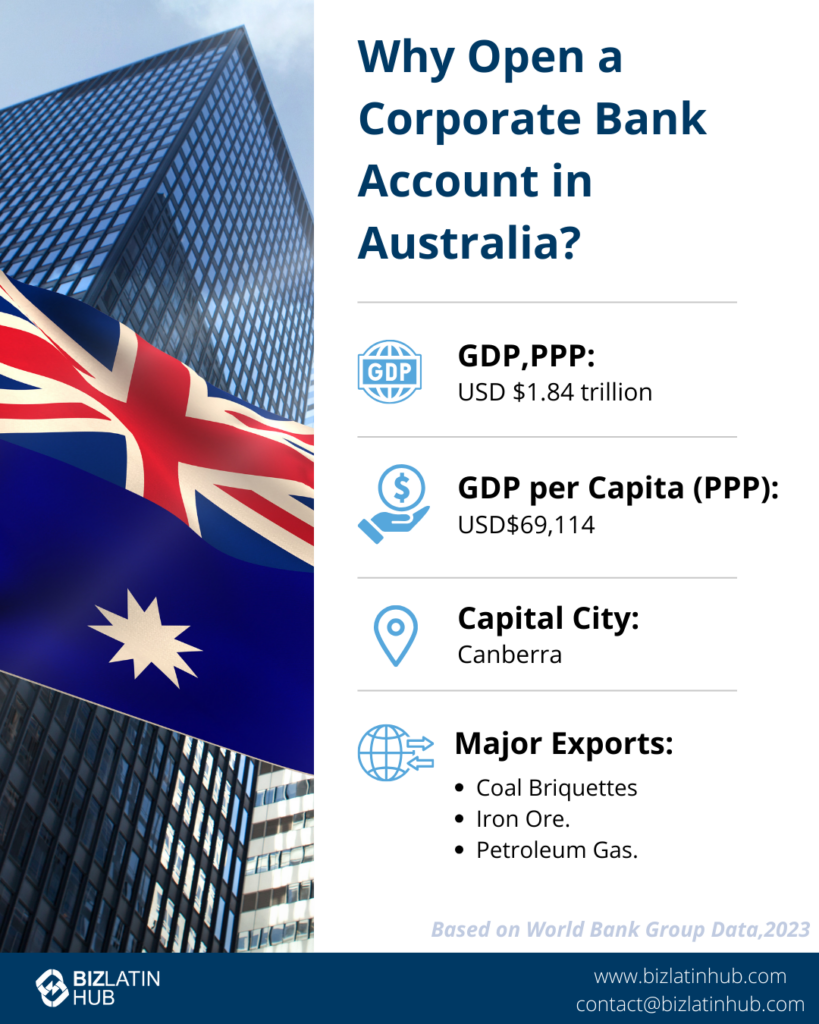Opening a business bank account in Australia is a crucial step for companies wishing to establish themselves in the country’s thriving market. Australian banks typically offer a range of account options tailored to the needs of businesses, essential when looking to register an LLC in Australia. Navigating this process correctly will ensure you hit the ground running navigating a business landscape distinct to Latin America. Australia is recognized for its stable banking system and transparent regulatory framework. It is a preferred base for regional headquarters, tech startups, and investment vehicles looking to operate across the Asia-Pacific.
Key takeaways on how to open a business bank account in Australia
| Which banks are best to set up a business bank account in Australia? | National Australian Bank Commonwealth Bank ANZ Bank Westpac |
| The four step process to set-up a business bank account in Australia: | Step 1 – Prior to your Bank Account you need to Register Your Business in Australia. Step 2 – Decide What Type of Bank Account You Need. Step 3 – Decide What Bank Your Business Will Use. Step 4 – Set Up Your Business Bank Account |
| Do all banks follow the smae process? | This is a general guide: you will need to check individual banks’ rules or contact one of our expert advisors for more detailed rules. |
| What are the necessary documents to open a business bank account in Australia? | Full company name, as registered with Australian and Securities Investments Commission (ASIC) Australian Company Number Australian Business Number Company’s registered office Company’s place of business Full names of ALL company directors Date and state of registration or incorporation Full business name/trading name Australia regulator and company license Foreign tax residency information (if applicable) |
Step-by-Step Bank Account Setup
To start your business in Australia, you’ll need to open a business bank account there. To do that you must follow these 4 steps:
- Step 1 – Prior to your Bank Account you need to Register Your Business in Australia.
- Step 2 – Decide What Type of Bank Account You Need.
- Step 3 – Decide What Bank Your Business Will Use.
- Step 4 – Set Up Your Business Bank Account

1. Prior to your Business Bank Account you need to Register Your Business in Australia
To open a business bank account in Australia, you must first register your business with Australian authorities and hold an ABN/ACN registration number. Therefore, any business wanting to open a corporate bank account will have to form an Australian company. Australian law recognizes the following business entity structures:
- Sole trader
- Company
- Partnership
- Trust.
Each business type is different and offers different benefits and tax requirements. It’s not compulsory to have a specific business account if you operate as a sole trader. However, it’s good practice to do so. If you have a company, partnership or trust, you must have a business bank account in order to operate.
2. Decide What Type of Bank Account You Need
There are different types of business bank accounts offered, so before opening an account, you need to have decided what option suits you best.
- Business Transaction Account (Checking): an account used for day-to-day operations, such as withdrawing cash and depositing cash payments from suppliers and clients. This account would also receive bank transfers and electronic payments from clients. A monthly fee may be charged, up to AU$20 or transactions chared pay-as-you-go. Accounts with fewer functions may waive the monthly fee. Additional fees for international payments vary from AU$10 to $30.
- Business Savings Account: this type of account can be used to earn interest on saved profits. Banks usually required notice before withdrawing funds from these types of accounts, so make sure there is sufficient money in your transaction account before you transfer money into your savings.
- Business Term Deposit: similar to a savings account but term deposits have expiry dates and fixed interest rates, to guarantee you a set return. You can only withdraw money before the term expires by paying a penalty fee. This could be in dollars terms or taken as a percentage from your return (e.g. 2% penalty from the 3.5% interest rate. The notice period is usually 31 days.
3. Major Banks Offering Business Accounts
Top banks include Commonwealth Bank, NAB, ANZ, and Westpac. These institutions offer streamlined onboarding, digital tools, and robust security protocols for foreign and local companies. Australia’s four biggest banks have good branch and ATM coverage across the country.
This makes them a convenient choice for your business account. Each offers slightly different accounts with periodic promotions (like free banking for new customers for a limited period). The ‘Big Four’ are listed here:
- National Australian Bank (NAB)
- Commonwealth Bank
- ANZ Bank
- Westpac
| National Australian Bank (NAB) | Commonwealth Bank | ANZ Bank | Westpac | |
| Monthly Account Fee | Offers a free business account | AUD$ 10 a month | Varies (check for current rates) | Varies (check for current rates) |
| Online Banking | Available | Available | Available | Available |
| Minimum Balance Requirements | Varies (check for current requirements) | Varies (check for current requirements) | Varies (check for current requirements) | Varies (check for current requirements) |
| International Transaction Fees | Applicable | Applicable | Applicable | Applicable |
| Free ATM Withdrawls (at Bank ATMs) | Select plans only | Select plans only | Select plans only | Select plans only |
| Available ATM Network | 3,400 | 4,300 | 3,850 | 7000 |
| Available Branches | 1,500+ | 1,100+ | 1,400+ | 3,400+ |
National Australian Bank
National Australian Bank (NAB) offers a fee-free business account. NAB allows free cash withdrawals from networked ATMs in Australia, as well as a host of other perks. It also offers specialized business accounts if you want an interest-bearing product. As one of the largest banks in Australia, you’ll have access to over 1,500 branches and 3,400 ATMs.
Commonwealth Bank
The Commonwealth Bank’s regular business bank account costs $10 a month to run. Moreover, it applies some additional transaction charges depending on usage. The Commonwealth Bank operates across the region, and the UK, and has over 1,100 branches worldwide. There are also over 4,300 networked ATMs.
Westpac
Westpac has a range of different business bank accounts. These run from low fee basic accounts to those designed for larger and more active businesses. It holds various offers and promotions attached to the accounts, including free banking for new customers. There are 1,429 branches and 3,850 ATMs in the Westpac network.
This bank also operates in New Zealand, which is helpful for further expansion considerations, and when/if travel to New Zealand is required for your work.
ANZ
ANZ Bank is Australia’s fourth largest bank and has two ‘everyday’ business bank accounts on offer. This includes a ‘low fee’ option. It also offers several more specialized banking products depending on your personal needs. The bank’s website has a comparison table with all the important facts about the accounts, including fees and charges. Like Westpac, this bank also operates in New Zealand which makes travel (if necessary) easy and convenient.
4. Set Up Your Business Bank Account
Each bank has its own specific requirements to open a business bank account. However, in general, most procedures work somewhat the same. You can start the initial sign up process online by entering your details and your ACN. You will then need to go to the bank branch to provide your identity documents and complete the account formation process.

Requirements to Open a Corporate Account in Australia
Regulated by AUSTRAC, banks conduct enhanced due diligence for foreign entities, including UBO declarations, source of funds verification, and compliance with FATCA/CRS obligations. Due to the Anti-Money Laundering and Counter-Terrorism Financing Act 2006, all account holders and signatories must be identified. The documentation differs for different business structures, however for a domestic private company, the following information is required from the company:

- Full company name, as registered with Australian and Securities Investments Commission (ASIC)
- Australian Company Number
- Australian Business Number
- Company’s registered office
- Company’s place of business
- Full names of ALL company directors
- Date and state of registration or incorporation
- Full business name/trading name
- Australia regulator and company license
- Foreign tax residency information (if applicable)
The ASIC certificate of registration and a public document issued by the company, such as an annual audit, is also required.
Businesses must provide an Australian Business Number (ABN), Tax File Number (TFN), company formation certificate, director/shareholder identification, proof of residential address, and a business activity summary. Some banks may require a local director or signatory.
Each signatory and the beneficial owner will also need to provide their own personal identity documents:
- One primary photographic identification document: Passport or driver’s licence (either Australian or foreign)
- or, One primary non-photographic identification document: birth certificate or citizenship certificate (either Australian or foreign) and one secondary identification document (listed in each banks identity checklists).
Tip: We recommend that, whenever possible, clients open accounts in both Australian dollars (AUD) and their home currency or other commonly used currency for their business transactions. This can facilitate international transactions and minimize foreign exchange fees
Do I Need Australian Nationality?
It’s not necessary to be a resident of Australia to open an account there. However, to open a business bank account, the company must be registered in Australia. The banks allow to apply online for a business bank account and present the documentation needed in branch later. This makes it feasible to at least start the process of opening an account before you arrive in Australia.
You can open your business account online while still abroad. However, this is only if a business is already registered in Australia. The Commonwealth Bank of Australia, for example, offers online verification for new customers. ID and company registration details can be checked online in real-time to speed the process up. However, this service isn’t available on all products.
Note for US citizens
If anyone involved in the creation of the business is a US citizen, they’ll be required to provide a tax identification number. If the business is involved in financial services, additional licensing details may be required. It may be possible for a company to nominate one person to certify signatories to the account. This means that only one person has to provide the full range of documents. Afterwards, this person can then authorize other colleagues to access the account.

Additional FAQs About Australian Business Banking
Based on our extensive experience these are the common questions and doubts from our clients when looking to open a business bank account in Australia.
You are able to start the process online, but will be required to go into a branch and complete the process.
You will require the following documents:
- Full company name, as registered with Australian and Securities Investments Commission (ASIC)
- Australian Company Number
- Australian Business Number
- Company’s registered office
- Company’s place of business
- Full names of ALL company directors
- Date and state of registration or incorporation
- Full business name/trading name
- Australia regulator and company license
- Foreign tax residency information (if applicable)
Access to a business bank account is restricted to authorized individuals, including directors listed with the Australian Securities and Investments Commission (ASIC), and authorized signatories appointed through formal resolutions. Additional access may be granted to account administrators, such as accountants, with limited permissions or to individuals holding a legal Power of Attorney. All authorized individuals must meet the bank’s identification and compliance requirements, including Know Your Customer (KYC) checks.
The choice of a bank would depend on various factors including the specific needs of the client, the range of services required, the locations of the company’s operations, and more. Some of the most popular banks in Australia are National Australian Bank (NAB), Commonwealth Bank, ANZ Bank and Westpac.
Many Australian banks offer foreign currency accounts for businesses, allowing transactions in multiple currencies. Requirements include business registration details, identification of directors or authorized signatories, and meeting the bank’s compliance standards.
Yes. Foreign-owned entities are permitted to open accounts, although some banks require a local signatory and additional compliance review.
It generally takes 1 to 2 weeks if all required documentation is submitted correctly and no enhanced due diligence is required.
Benefits of Australian Business Banking
When selecting a bank for your business account, evaluate factors such as fees, transaction limits, online banking features, and additional services, including business loans, trade support, and foreign exchange solutions. Conducting thorough research and comparing banking options ensures you choose one aligned with your business needs and objectives.
Australia has a GDP of US$1.3 trillion and a GDP per capita of approximately US$55,926. The country ranks among the most globally connected nations, maintaining free trade agreements with regions including the Americas, Asia, the Gulf, and Europe. Growing trade relations with Latin America, supported by evolving bilateral agreements, provide entrepreneurs with opportunities for both local and international business growth in Australia.
Specialized Needs Call For Specialized Assistance
Setting up a business bank account in Australia does not have to be a difficult process. The country has a range of different banks with different account benefits along with special services for foreigners. However, to be able to fully benefit from all the special services, knowledge of corporate requirements is needed.
In order to set up your desired entity in Australia, a local partner might be of help. Biz Latin Hub is an expert in connecting businesses and supporting startups in the region.
Our recently-received award for Business Excellence by the Australian-Latin America Business Council demonstrates the support we receive from Australian institutions. Find out more about how we can transform the fortunes of your business. Contact us today for assistance tailored to your needs.






